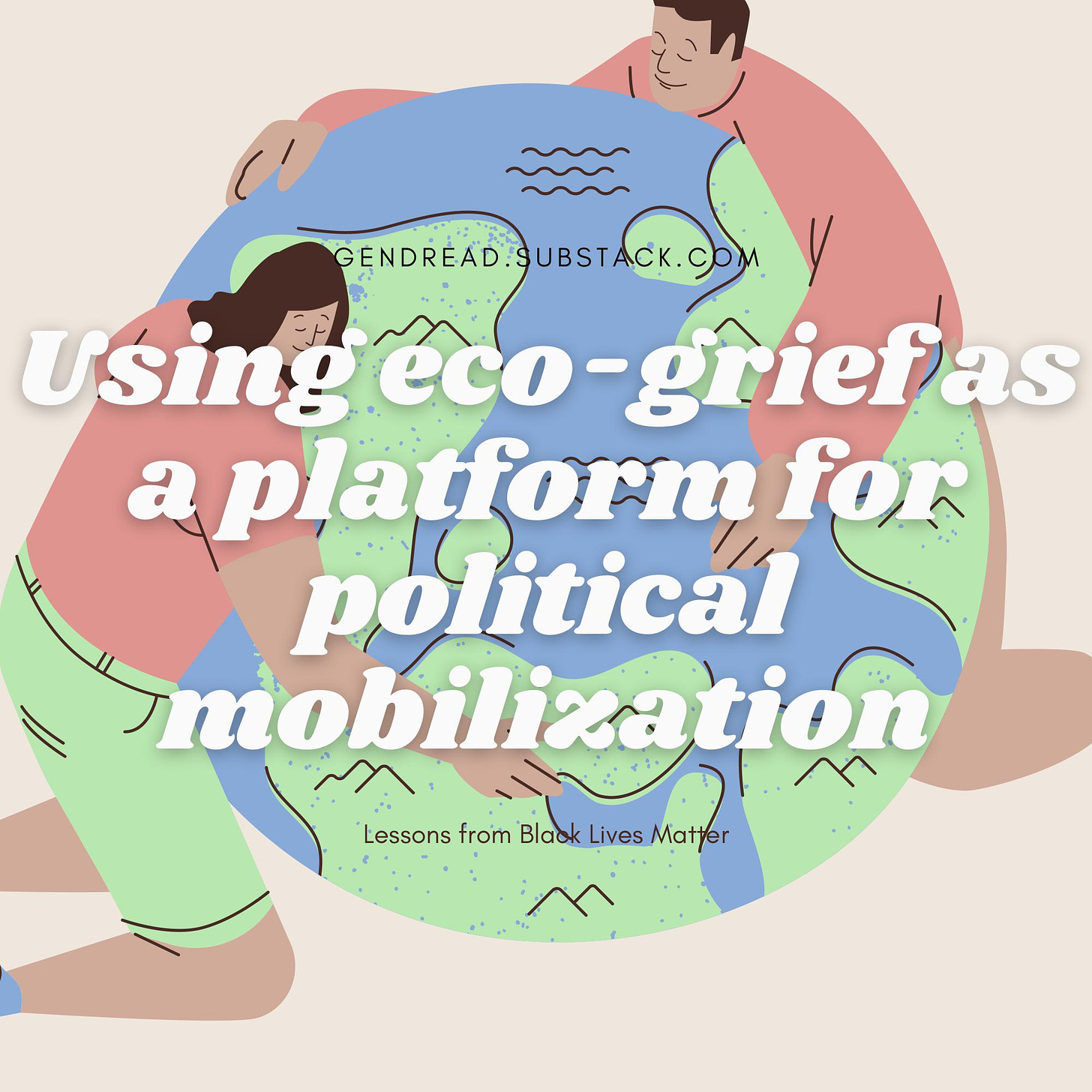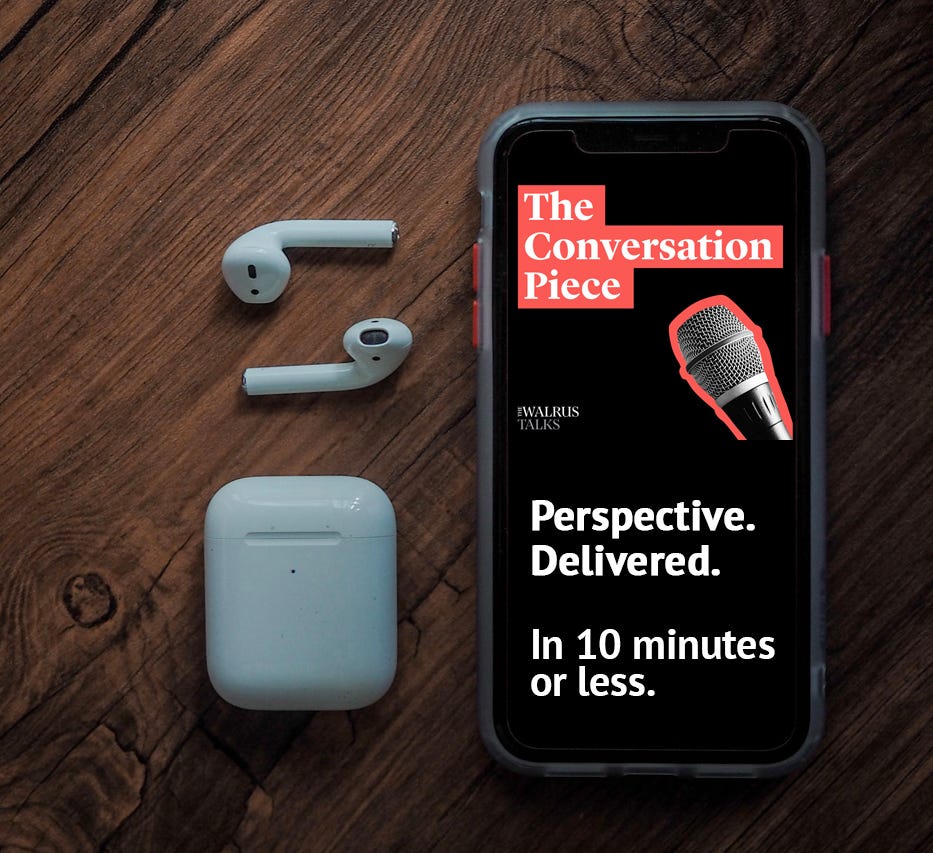Using eco-grief as a platform for political mobilization
Lessons for the environmental movement from Black Lives Matter
Hi and welcome back to Gen Dread!
(If it’s your first time here, why not sign up for free weekly articles about staying sane in the climate crisis, delivered straight to your inbox?)
Housekeeping
I got some good feedback from a reader last week that it would be preferred if Gen Dread came out on a regular day of the week. I am up for that, and so Dear Reader, you can expect your weekly dish of dread to be served up on Wednesdays from here on out. Yay!
Getting into it
Biden won, thank gooooodness! This week I want to hone in on an emotional theme that connects with what the Biden-Harris team has said they will prioritize alongside the climate crisis, COVID-19, and economic recovery. Namely, racial justice.
What do eco-emotions have to do with Black Lives Matter?
The Movement for Black Lives has been exceptional at transforming difficult emotions into a platform for mobilization. The movement itself is a perfect example of how mourning is a political act. How so?
Systemic racism and police brutality breed a lot of rage because they’re so wildly unjust. They also generate a lot of deep, soul-rocking grief, which gets held within the bodies of individuals. When people come together over their privately felt grief, they begin to mourn as a collective. As much as BLM protests have been tools for social change, they’ve also been rituals of collective mourning. Mourning becomes political when it pushes back against silence, in cases where the dominant forces in society have not yet acknowledged the gravity of the losses that people are grieving. When we don’t name who or what has died, it sends the message that their lives did not matter. Simple as that.
In the space between mattering and not mattering lies a difficult terrain that must be traversed in order to bring losses from the realm of the unjustly unacknowledged to that which is recognized. In Mourning Nature, eco-grief researcher Ashlee Cunsolo writes about how in the 1980s, AIDS activists had to raise all kinds of hell to get leaders to publicly acknowledge that thousands of gay men, African Americans and intravenous drug users were dying from the AIDS epidemic. Before an adequate medical response could be politically supported, the human losses would need to first be named, and as such, made to matter. Solutions can’t be devised for crises that no one in power is willing to call out as the tragedies they are.
And so, a BLM slogan like #SayHerName is so powerful because it brings people together to once again put a spotlight on human losses that have been undervalued by the dominant order in society. That spotlight then creates a platform for mobilizing, where people can connect with each other over a shared emotional experience (grief). Once connected, they can strategize about how they’re going to work to remove the harm-causing agent that is giving them reason to grieve in the first place.
Now imagine what this pipeline - from pain to political action - means in the context of ecological loss. When we lose 3 billion animals in Australian bushfires, or a glacier, or a zone of habitability and it makes us feel grief, we have no social norms for how to process this. The grief generally remains unspoken. When we don’t acknowledge the losses, or talk about the pain they bring, we say that we aren’t willing to do the hard work of bringing these losses from the realm of the unacknowledged - where social norms would have them dwell - into the realm of what matters. But the ecological losses we are experiencing are radically dangerous, and we ought to start exercising the political tool that mourning has always been.
Some environmentalists have taken stabs at this. Extinction Rebellion has The Red Brigade - - - those striking clown-esque figures who pop up at their protests draped in cloth, looking like they’ve been crying for 100 years. To me, they feel more like a spectacle one watches from the sidelines than an authentic mourning ritual one can get involved in. Remembrance Day for Lost Species happens each year on November 30th, where artist-environmentalists hold rituals for extinct creatures. And the artist Sarah Friend keeps a digital collection of ‘climate memorials’ here. So there have been some creative attempts. What I’m left wondering, is what does it mean for us to take the work of collective mourning seriously, as a massive environmental movement? If we can get our leaders to legitimize the pain of ecological grief, would that help us be more effective at removing the harm that is causing so many ecological losses in the first place?
Guilt
The last thing I want to say about the connection between Black Lives Matter and eco-emotions focuses on guilt. Guilt is often seen as a useless emotion that keeps a person self-lacerating, making their feelings worse. This inward focus is self-absorbed, and holds them back from doing what good they can. But that interpretation of guilt is what the psychiatrist Robert Jay Lifton would call static guilt, and it significantly differs from animating guilt. In contrast, animating guilt can be found whenever a person brings themselves to life around their guilt, releasing a kind of reparative energy. Instead of focusing inwards, they look outwards to see how their guilt can help them make amends for the harm they’ve caused.
People like me, who’ve benefited from white supremacy, could stew in gross feelings of white guilt. Or, we could use those feelings as motivation to try and transform the system that gave us our white privilege in the first place, harming others as it did. It can motivate us to join racial justice movements and do the deep internal work that comes with learning how to be anti-racist. We have a choice to make in how we deal with our guilt, and Lifton helps us see that this emotion isn’t always a waste of time.
Guilt is also an eco-emotion. Many feel guilty about the jobs they work, cars they drive, and factory farmed food they eat. It all boils down to feeling guilty for participating in our carbon-intensive late-Capitalist system, which can feel impossible to know how to exit in order to live another way. Environmental guilt is often static. It can prevent people from taking action because they feel ashamed and consequently shut down. But what if the environmental movement learned how to shift people’s guilt from the static register to the animating kind? If we’re thoughtful about it, we might make a resource out of this awful emotion. After all, there’s a whole lot of environmental guilt to bring ourselves to life around.
In conclusion, we need to understand our eco-emotions better. They can do so much in the world. Their transformative potential becomes graspable when we no longer bottle them up inside, connect with each other over them, and move their energetic potential from the inside-out.
I’ll end with a quotation from Cunsolo and Ellis, who encapsulate this idea beautifully in their article Ecological grief as a mental health response to climate-change related loss:
“Confronting ecological grief will be difficult and challenging work, both professionally and affectively. Indeed, to seriously engage with the concept of ecological grief is to become open, in a personal sense, to the magnitude of the ecological challenges facing our global society. There is much (grief) work to be done, and we need to do this work individually and collectively, publicly and privately, ethically and politically, in order to enhance our understanding of climate change impacts, and to expand discussions on what is to be done.”
Some things from me in the last week
If you want to hear more of my thoughts on climate psych, mental health, and eco-emotions, in the past week I was a guest on the following podcasts: In This Climate, SustainaBold, and Social Shift.
The dread diminishes when we come together!
You can follow me on Instagram, hit me up on Twitter, or reply to this email if you’re already subscribed. If you’re not yet, welcome!
What do you want to see covered in more depth when it comes to the psychological impacts of the climate and wider ecological crisis? Let me know. I love hearing from readers and always find a way to respond.
Found this article worth your while? Share it with the great people in your life.
If you want to support independent research and writing about the psychological impacts of the climate and eco-crisis, the best way to do that is to spread the word about it.
Gen Dread is happy to lift up The Conversation Piece, a podcast from The Walrus (my favourite magazine from my homeland). The Conversation Piece features some of the most engaging and fascinating thought leaders in Canada.





